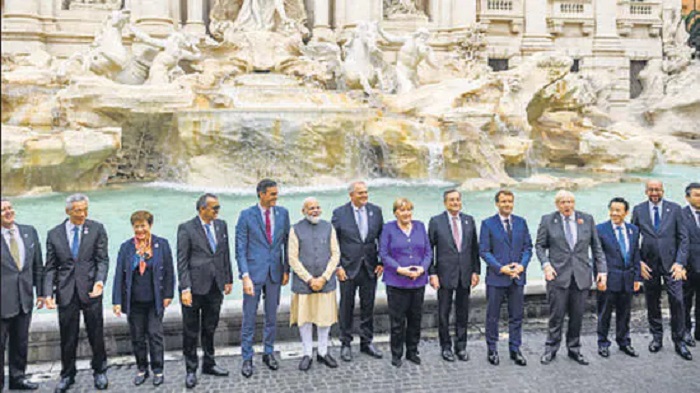
Prime Minister Narendra Modi will outline New Delhi’s perspective on food and energy security, health and digital transformation at the G20 Summit in Bali, which will see Indonesia handing over the presidency of the grouping of the world’s 20 largest economies to India.
Modi will join world leaders such as US President Joe Biden, Chinese President Xi Jinping, UK Prime Minister Rishi Sunak and French President Emmanuel Macron at the annual summit during November 15-16. Russia has announced that President Vladimir Putin will not attend and the country’s delegation will be led by foreign minister Sergey Lavrov – a reflection of the divisions within G20 over the Ukraine conflict.
The summit will have three working sessions for the leaders devoted to food and energy security, health, and digital transformation, and the heads of the G20 members are expected to discuss key issues such as the state of the global economy, environment and climate change and agriculture.
The presidency of G20 – which brings together Argentina, Australia, Brazil, Canada, China, France, Germany, India, Indonesia, Italy, Japan, South Korea, Mexico, Russia, Saudi Arabia, South Africa, Turkey, the UK, the US and the European Union and represents 85% of global GDP and more than 75% of global trade – will be handed over to India in Bali.
The tensions over Russia’s invasion of Ukraine are expected to loom large over the meeting, with Sunak saying on Sunday he intends to “call out Putin’s regime” at the G20 Summit, which “will not be business as usual”. Over the past few days, teams from all the G20 members have been struggling to finalise a joint communiqué to be issued at the end of the summit, with consensus held up over a reference to the Ukraine war in the draft document.
Foreign secretary Vinay Kwatra told a media briefing on Sunday that India has always actively engaged with all the G20 members and extended “steadfast and strong support” to Indonesia, this year’s president of the grouping, as it has “shown strong leadership in ensuring the G20 discusses issues of substantive interest”.
The summit in Bali is being held against the backdrop of environmental challenges, lack of progress in the Sustainable Development Goals (SDGs) and the impact of the Covid-19 pandemic, and at a time when the world is struggling with other challenges such as the uneven post-pandemic economic recovery, debt vulnerabilities, especially in developing countries, the Ukraine conflict and its knock-on effects such food and energy security and inflation, Kwatra said.
The Indian side, he said, is expected to keep the focus on the challenges facing developing countries, the “continuing uncertainty related to energy security”, the need for a global response to climate challenges and food and health security, he said. These objectives also present opportunities, such as the use of digital tools and platforms for the efficient and transparent delivery of governance, he added.
There was no official word on the Indian prime minister’s bilateral meetings on the margins of the summit, though people familiar with the matter said he is expected to meet Saudi Crown Prince Mohammed bin Salman, Sunak, Macron and other leaders. Modi is not expected to meet Xi, the people added.
Kwatra said bilateral meetings with several G20 leaders are “still in the process of being scheduled”, and didn’t go into details. Modi will also invite G20 leaders to India for the next summit in New Delhi in September 2023. India’s G20 presidency will focus on green development, Mission LiFE, digital transformation, inclusive and resilient growth, women-led development, and a greater voice for developing countries.
He said the joint communiqué was still under negotiation and the Indian team led by the sherpa was engaged in these consultations in Bali. “The communiqué is in fairly advanced stages of negotiation but it’s not final at this stage…The G20 communiqué is by consensus, it is not a document that is voted upon,” he said.
The communiqué is the culmination of a yearlong set of meetings, including at least 12 ministerial meetings over the past six months. “The political context of what’s happening in the world is a part of it, whether [it is the Ukraine] conflict or the knock-on effect. In what way it emerges finally in the communiqué…remains to be seen…,” he said.
Consensus outcome documents have eluded a majority of the preparatory meetings this year because of differences over the Ukraine crisis and Lavrov even walked out of a G20 foreign ministers’ meeting in July. Concerns have grown in recent weeks that there may not be joint communiqué in Bali. Though Russia has said Putin is not attending, reports have said the G20 leaders will skip a tradition joint photo at the opening of the summit.
Kwatra said India will strive to steer the G20 agenda for 2023 in a “representative and balanced manner”, and noted the G20 Troika – which groups the current, incoming and next presidencies or Indonesia, India and Brazil – will for the first time have all developing economies.
The G20 leaders are expected to visit a mangrove forest in Bali on November 16 to highlight the importance of mangroves acting as bio-shields against extreme climate events. Modi will also participate in a reception with the Indian community on November 15. (Hindustan Times)
